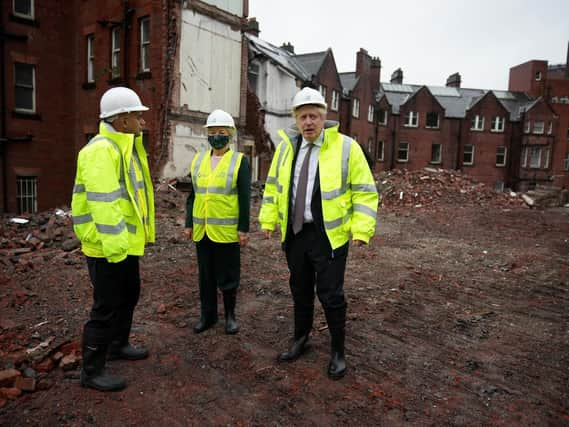Focus Government's £4bn Social Housing Decarbonisation Fund on North 'to deliver on levelling up', says report


A report by Homes for the North set out research putting the case for the Government’s £3.8bn Social Housing Decarbonisation Fund to be targeted in this region.
It said of the 10 local authorities with the biggest potential for making improvements to energy efficiency, five are in the North, including two in Yorkshire – Ryedale and Richmondshire. Meanwhile, of the 33 most deprived local authority areas in England, 21 are in the North.
Advertisement
Hide AdAdvertisement
Hide AdIt said: “It is therefore abundantly clear that, by focusing the majority of the Social Housing Decarbonisation Fund on the North, the Government will be able to address the objectives of both the Net Zero and levelling up agendas at the same time.”
Nigel Wilson, chairman of Homes for the North, said: “We’ve got the Social Housing Decarbonisation Fund, we’ve got other programmes that are coming but what we’ve got to do is make sure we’ve targeted those in the right way. I think we’re all prepared to invest. But we need the trigger to very much be Government to do that.
"We need to have a sensible grown up discussion and debate about how we can scale that and focus it. One of the frustrations is the sort of the competitive element of having local authority bidding against local authority – we’ve got to get past that.”
But the report also warns that providing energy from more environmentally-friendly sources risks increasing people’s bills.
Advertisement
Hide AdAdvertisement
Hide Ad“Whilst upgrades to heating systems and boilers can deliver well on purely environmental goals, there is something of a conflict with social and economic objectives which are core to levelling up. Gas remains straightforward and, most importantly, cheap relative to electricity.
“Therefore, decarbonisation programmes which focus on transitioning away from gas first – particularly where residents affected are on relatively low incomes risk increasing issues of fuel poverty and accompanying impacts such as ill-health.”
Mr Wilson said: “Fundamentally we’re moving away from gas and we’re moving to electric and the cost of electric traditionally has been more expensive than gas. But there is still that affordability challenge and we’ve got to find ways of bringing the cost of the equipment down.”
He said part of the challenge will be encouraging behaviour change. “We are used to as a nation thinking, ‘I’m feeling cold so I am turning the heating up’. Lots of new heating systems are about ambient temperatures, about keeping your home at 21 degrees, not turning heating on and off.”
Advertisement
Hide AdAdvertisement
Hide AdBut he added that committed Government investment in technology like heat pumps will start to make changes to properties more affordable.
“If there’s enough long-term investment, then manufacturers come in at scale and bring the cost down. At the moment, a heat pump is costing £11,000 to £12,000. That’s not massively affordable compared to a boiler you can install for £1,200.
"We’ve got to find a way of redressing that so we can make that more affordable to deliver. The way we do that is by saying we’re going to spend x billion pounds a year doing this at scale. And then people will turn on the manufacturing button.”
Read more:
Support The Yorkshire Post and become a subscriber today. Your subscription will help us to continue to bring quality news to the people of Yorkshire. In return, you'll see fewer ads on site, get free access to our app and receive exclusive members-only offers. Click here to subscribe.
Comment Guidelines
National World encourages reader discussion on our stories. User feedback, insights and back-and-forth exchanges add a rich layer of context to reporting. Please review our Community Guidelines before commenting.